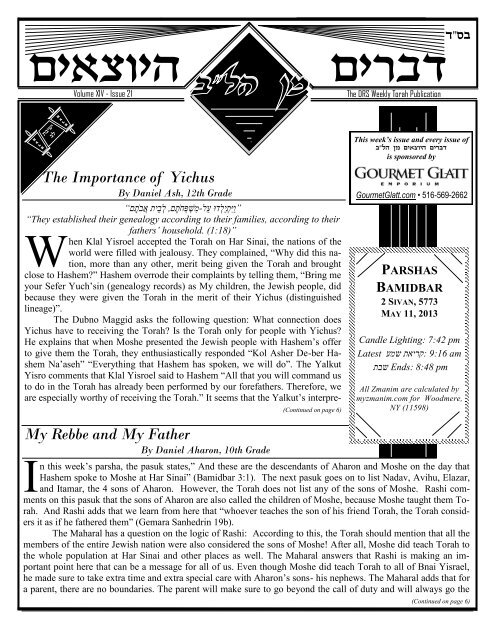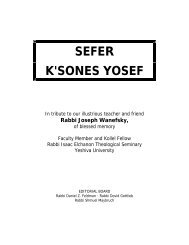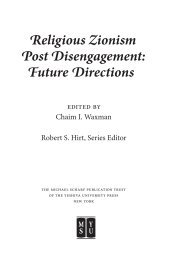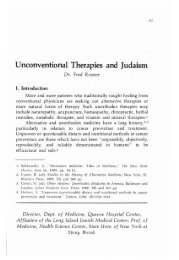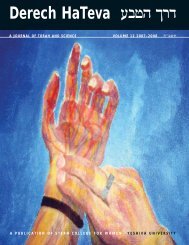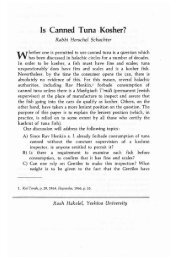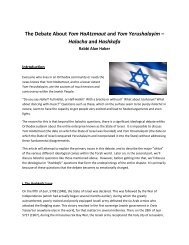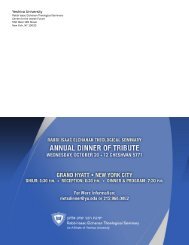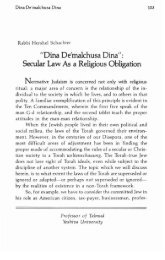The Importance of Yichus - YU Torah Online
The Importance of Yichus - YU Torah Online
The Importance of Yichus - YU Torah Online
Create successful ePaper yourself
Turn your PDF publications into a flip-book with our unique Google optimized e-Paper software.
Dvarim Hayotzim Min Halev 3Taken from Aish.com0 201326 IyarYahrtzeit <strong>of</strong> Rabbi Moshe Chaim Luzzatto (1707-1747),author <strong>of</strong> classic works <strong>of</strong> Jewish philosophy, known bythe acronym <strong>of</strong> his name, Ramchal. He was born in Italywhere he quickly became known for his vast <strong>Torah</strong>knowledge and beautiful literary style. It is said that byage 14, he already knew the entire Talmud and Midrashby heart. Ramchal's Path <strong>of</strong> the Just, which describes astep-by-step process to attaining spiritual perfection, is aclassical work <strong>of</strong> Mussar (Jewish ethics) that is studiedwidely today. Other <strong>of</strong> Ramchal's important works include<strong>The</strong> Way <strong>of</strong> God, a systemized study <strong>of</strong> Jewishphilosophy, and Da'at Tevunot, an exposition on kabbalisticconcepts. Ramchal moved to Amsterdam where heworked as a diamond cutter, and later to Israel, where heperished in a plague at the age <strong>of</strong> 40. He is buried next tothe famed Rebbe Akiva on a hillside in Tiberias.27 IyarIn 1945, the <strong>The</strong>resienstadt concentration camp was liberated.<strong>The</strong>resienstadt was not a death camp by the usualdefinition. It was the center <strong>of</strong> a Nazi PR ploy -- a mythic,idyllic city that was supposedly built to protect Jewsfrom the vagaries and stresses <strong>of</strong> the war. <strong>The</strong> Red Crosswas once allowed to visit <strong>The</strong>resienstadt, which wasspruced up for the occasion; inmates were dressed up andbaked goods suddenly filled the shelves. (<strong>The</strong> Red Crossconcluded that the Jews were being well-treated.) In reality,starvation and disease proved rampant. Of the200,000 people (mostly Czech Jews) who passed throughits gates, thousands died <strong>of</strong> malnutrition and exposure,and others were sent to Auschwitz.28 IyarIn 1967, Israeli paratroopers completed their capture <strong>of</strong>the Old City <strong>of</strong> Jerusalem, restoring Jewish control <strong>of</strong> theTemple Mount, Judaism's holiest site. Soldiers danced,sang and cried at the Western Wall, the site <strong>of</strong> Jewishprayers for centuries. A plaza was cleared in front <strong>of</strong> theWall, and one week later, tens <strong>of</strong> thousands <strong>of</strong> Jewsswarmed to the site on the holiday <strong>of</strong> Shavuot. Iyar 28 iscelebrated today as Yom Yerushalayim, commemoratingthe reunification <strong>of</strong> the Holy City, which has stood as thecapital <strong>of</strong> the Jewish nation for 3,000 years.29 IyarYahrtzeit <strong>of</strong> Shmuel (Samuel) the Prophet (930-878BCE). Shmuel was born to Chana, who had been barrenfor many years and prayed intensely for a child. Shmuelwas raised in an atmosphere <strong>of</strong> great holiness, and becamea leading prophet in Israel. Shmuel's greatest contributionwas in anointing the first king <strong>of</strong> Israel, Saul,and later anointing King David in his stead. (Somesources list Shmuel's yahrtzeit as 28 Iyar.)1 SivanIn the Hebrew year 2448 (1312 BCE), seven weeks afterthe Exodus from Egypt, the Jewish people arrived atMount Sinai. <strong>The</strong>y spent the next five days in intensepurification and preparation to receive the <strong>Torah</strong>.2 SivanIn 1946, Rumanian leader Ion Antonescu was executedfor his role in World War II. Antonescu passed dozens <strong>of</strong>anti-Jewish laws, and directly ordered pogroms and deportationsto concentration camps. Antonescu, whosestepmother and wife were both Jewish, said: "I give themob complete license to massacre [the Jews]. I will withdrawto my fortress, and after the slaughter, I will restoreorder." Under his governance, approximately 300,000Jews were killed in Romania and Transnistria, wheremany had been deported. Toward the end <strong>of</strong> the war, Antonescuwas arrested and put on trial by the Communistgovernment in Bucharest -- on the primary charge <strong>of</strong>having supported the German invasion <strong>of</strong> the USSR. Hewas sentenced to death and executed.
דברים היוצאים מן הל “ב 4Fire, Water, and DesertBy Uri Himelstein, 11th Grade<strong>The</strong> Medrash on the beginning <strong>of</strong> Bamidbar states that the <strong>Torah</strong> was given though three things: fire, water,and desert. <strong>The</strong> obvious questions are, what do these three things have to do with one another, and also whatdo they have to do with <strong>Torah</strong>?<strong>The</strong> author <strong>of</strong> the Sefer Chashav S<strong>of</strong>er explains that these three things symbolize the difficulties all menface and how they must struggle through them while still grasping the <strong>Torah</strong>. Fire is constantly flickering; at timesit is high and at times it is low, yet the flame is always burning. This represents a person’s success which varies,or flickers, yet he must always keep the <strong>Torah</strong> burning. One <strong>of</strong> water’s intrinsic properties is that it is always movingto lower elevation. Yet, as low as it gets it is still flowing. This shows that we must keep the <strong>Torah</strong> no matterhow low we flow. Finally, the desert represents a barren wasteland. In the real world this is Galus. Yet, even in thelowest <strong>of</strong> times we must never separate from the <strong>Torah</strong>.Rav Meir Shapiro takes a different approach. He explains that these three things represent tests that wewent through in order to receive the <strong>Torah</strong>. <strong>The</strong> first test we went through was that <strong>of</strong> fire. This is referring to Avraham’stest <strong>of</strong> being thrown into the Kivshan Ha’aish. This mesiras nefesh set the stage for all the other acts <strong>of</strong>extreme self sacrifice seen throughout our history. However, this wasn’t enough; this just showed that one man inone generation was great. Why should the whole nation receive the <strong>Torah</strong>? <strong>The</strong>refore, we received the test <strong>of</strong> water.At the Yam Suf, an entire nation jumped into the water simply relying on their Bitachon in Hashem. However,this too wasn’t enough, this was just a momentary test. All they had to do was jump in, nothing more, certainlynot enough to merit the <strong>Torah</strong>. So the final test came. <strong>The</strong> Bnei Yisroel had just gone through a terrible enslavement,yet they decided to follow Hashem by subjecting themselves to the desert, a desert totally devout <strong>of</strong> resources,save for poisonous snakes and scorpions. This test, a true long term commitment taken by the entire nation,showed Hashem the worthiness <strong>of</strong> the people to receive the <strong>Torah</strong>.Adapted From <strong>Torah</strong> Lada’as by R’ Matis BlumShavuos, Yom HadinBy Yaakov Bluestein, DRS Alumnus<strong>The</strong> Sefer Hakuntress brings down in the name <strong>of</strong> the Shla, that Shavuos is the Yom HaDin (the day <strong>of</strong>judgement) for how much <strong>Torah</strong> every person will acquire in the upcoming year. Knowing this, how is a personsupposed to be zoche (merit) a good decree in his Limud Ha<strong>Torah</strong> for the upcoming year?B''H many people in Klal Yisroel have taken upon themselves to stay up learning throughout the night.But in addition to this, a very important way for us to be zoche this hatzlacha is by davening for success in learning.<strong>The</strong>re are many times in tefila that we ask Hashem for success in our <strong>Torah</strong> learning. To give a few examples<strong>of</strong> this, in the bracha <strong>of</strong> “Hamavir Shayna,” we ask Hashem: 'shetargelanu betorahtecha' - accustom us to studyingYour <strong>Torah</strong>; in the bracha <strong>of</strong> “Ahava Rabba,” we go to great lengths to ask Hashem to allow us to understand the<strong>Torah</strong> and to 'enlighten our eyes to Your <strong>Torah</strong>'; and at the end <strong>of</strong> “Rebbe Yishmael” and twice in every Yom TovShemone Esrei, we ask Hashem to grant each <strong>of</strong> us our own unique share in the <strong>Torah</strong>.This kavana is especially important to keep in mind for those that plan to stay up all night learning <strong>Torah</strong>.After staying up learning, the Yetzer Harra could try to convince us, 'don't worry, its ok if I have a little less kavanain davening because after all, I'm tired and I've been learning <strong>Torah</strong> all night.' <strong>The</strong>refore, it’s especially importantthat each <strong>of</strong> us make a special effort to have kavana to ask Hashem for a good din regarding our learningfor the coming year.May we each be zoche to a good din regarding our learning for the upcoming year!
דברים היוצאים מן הל “ב 6(Daniel Ash — Continued from page 1)tation is based on a play <strong>of</strong> the word “Na’aseh”, “We will do” – it is to be read “Na’asuh”, “It was alreadydone” (by our forefathers).<strong>The</strong> Yalkut makes this radical change from the simple meaning <strong>of</strong> the passuk because there is an obviousquestion one could ask about Klal Yisroel’s unambiguous statement, “Everything that Hashem has spoken we willdo” – How could sincere people undertake a responsibility to do whatever they were commanded? How couldthey be sure that they would be able to honor their commitment? <strong>The</strong> answer is that the fact their forefathers hadalready fulfilled Hashem’s commands under the most difficult circumstances made it possible for them, the children,to make such a commitment. So the Yalkut is explaining that the reason why Klal Yisroel proudly declared“Na’aseh”, “We will do”, was that “Na’asuh”, “It was already done”.<strong>The</strong> Vilna Gaon adds that the simple meaning <strong>of</strong> the Bracha that we make before reading from the <strong>Torah</strong>,“Asher Bachar Banu Mikol Ha’amim V’nasan Lanu Es Toraso”, “Who selected us from all the nations and gaveus His <strong>Torah</strong>”, does not refer to the Jewish people at the time <strong>of</strong> Matan <strong>Torah</strong>. It refers to the Avos: Avraham,Yitzchak and Yaakov. Hashem chose THEM to become the forebears <strong>of</strong> His beloved people, because they servedHim with love and joy even under the most trying circumstances. This created an eternal bond between Hashemand their descendants. <strong>The</strong>refore, Hashem gave Klal Yisroel the <strong>Torah</strong> only because <strong>of</strong> their <strong>Yichus</strong>.Written(Daniel Aharon — Continued from page 1)extra mile, without setting any limits or restrictions. When Rashi says that whoever teaches a friend <strong>Torah</strong>, it’s asif he fathered him, it only applies when the Rebbe acts like a father would act for the child.Rav Yissocher Frand relates a beautiful story that helps to illustrate the point <strong>of</strong> the Maharal. Rabbi Frandheard the story from Rav Shiya Fishman, who is the Executive Vice-President <strong>of</strong> <strong>Torah</strong> U’Messorah. When RavFishman was younger, he had a child who was in a serious medical condition. Needing Chizuk, he went to hisrebbe, Rav Yitzchok Hutner (1907-1980). As Rav Fishman was relating to his Rebbe all <strong>of</strong> his personal strugglesand difficulties, he began to break down in tears and cover his face with his hands. After he recovered, he lookedback towards his rebbe. Rav Hutner, too, was crying. <strong>The</strong> rebbe felt the pain <strong>of</strong> his beloved talmid. <strong>The</strong> student’stears were the rebbe’s tears as well. Rav Hutner was not just a teacher. He was the embodiment <strong>of</strong> the rebbethe <strong>Torah</strong> refers to when it calls Moshe the father <strong>of</strong> Aharon’s children.(Parsha Questions — Continued from page 2)ried to Elisheva, the sister <strong>of</strong> Nachshon (Exodus 6:23).5. Reuven, the son <strong>of</strong> Yaakov (Numbers 1:20), and Nadav the son <strong>of</strong> Aharon (Numbers 3:2), are each called afirstborn.6. <strong>The</strong> deaths <strong>of</strong> Nadav and Avihu are mentioned (Numbers 3:4).7. <strong>The</strong> deaths <strong>of</strong> the Egyptian first born is referenced in the law <strong>of</strong> redemption <strong>of</strong> first born sons (Numbers 3:13).8. Number 3:19 mentions Moshe's uncle Chevron (the brother <strong>of</strong> Moshe's father Amram), who shares the name <strong>of</strong>a well-known ancient city in the land <strong>of</strong> Israel where the Patriarchs and Matriarchs are buried (Genesis 23:19).9. Before being transported, many <strong>of</strong> the Tabernacle vessels are covered with skins <strong>of</strong> the tachash animal(Numbers 4:6, 8, 10, 11, 12, 14). <strong>The</strong> identity <strong>of</strong> this animal is not conclusively known (see Rashi - Exodus25:5).10. Five members <strong>of</strong> Aharon's family the High Priest all have names beginning with the letter alef: Aharon, hiswife Elisheva, and their three sons: Avihu, Elazar and Itamar.To sponsor an issue <strong>of</strong> please email us at info@hayotzim.com
Dvarim Hayotzim Min Halev 7-(Stories <strong>of</strong> Greatness — Continued from page 8)prise. He happily accepted their request. Having heardindividual Jews singing their prayers before, he figuredto himself that a whole congregation <strong>of</strong> them shouldprove to be quite an entertaining spectacle for himselfand his fellow aristocrats. He promised the tenants thathe and his associates would definitely attend. He thendismissed them and immediately launched preparationsfor a huge party for all the Polish aristocrats in the region,the highlight <strong>of</strong> which would be the spectacle <strong>of</strong>the Jewish prayer that would take place on the groundshe had leased to one <strong>of</strong> his tenants. <strong>The</strong> invitations hesent out included his promise <strong>of</strong> a “highly amusing surprise.”<strong>The</strong> Shpoler Zeide arrived early in the day beforeShavuot, with a large number <strong>of</strong> followers accompanyinghim. <strong>The</strong>y quickly realized there would not beenough room on the farm for so many people. <strong>The</strong> rebbetold them to go to the nearby hill and raise up a largeawning there, under which they would set up a platformwith a table on it for the reading <strong>of</strong> the <strong>Torah</strong>.Shavuot morning arrived. <strong>The</strong> grassy landsaround the hill were crowded with hundreds <strong>of</strong> Jews,waiting in nervous anticipation to see what would happen.A significant number <strong>of</strong> gentiles—all the dukes,counts and lords, and other wealthy landowners andnobility in the region—also waited eagerly, looking forwardto the wonderful surprise their host had promisedthem.<strong>The</strong> rebbe approached the platform to lead theprayers himself. A hush fell over the assembly. <strong>The</strong>Jews began to pray with enthusiasm. <strong>The</strong> gentiles—seeing an old man with a long beard, covered from headto knees with an oversized white shawl with stringsdangling <strong>of</strong>f it to the ground, chanting loudly the words<strong>of</strong> the prayers while all his limbs seemed to be tremblingand shaking—all laughed heartily. But when hecalled out in a extraordinarily powerful voice, “ShemaYisrael . . . echad,” their laughter ceased instantly. Itwas as if a lion had roared. <strong>The</strong>y were gripped by terror.<strong>The</strong>y tried to hide it with nervous smiles. Howcould a puny, absurd Jew make them afraid? But theycouldn’t shake the mood as the Zeide’s voice continuedto reverberate <strong>of</strong>f the hillside, until, a few minutes later,the praying Jews stood absolutely still and silent.<strong>The</strong> repetition <strong>of</strong> the festival Standing Prayerwas followed by the joyous singing <strong>of</strong> Hallel(“Thanksgiving”) and chanting <strong>of</strong> the Akdamut. <strong>The</strong>festival joy was palpable. <strong>The</strong> rebbe signaled for the<strong>Torah</strong> scroll to be brought out and rolled to its properposition in the <strong>Torah</strong> portion <strong>of</strong> Yitro for the Shavuotreading. (Ex. 19–20) He then gazed at the surroundingcrowd and slowly swiveled his head. It was clear thathe was searching for someone. His gaze finally settledon a tall, very distinguished-looking man whom nobodyelse seemed to know. <strong>The</strong> Zeide summoned him to bethe <strong>Torah</strong> reader.Everyone murmured in surprise, but they weresoon pleased by the choice. <strong>The</strong> guest’s voice was bothmusical and powerful. When they reached the section<strong>of</strong> the Ten Commandments, the atmosphere altered radically.It had been a beautiful, clear spring morning.<strong>The</strong> sun was shining brightly, the sky a solid sheet <strong>of</strong>pastel blue, with not a dot <strong>of</strong> cloud to be seen. Suddenlythe heavens darkened, and tremendous peals <strong>of</strong> thunderboomed down upon them. Fright took hold <strong>of</strong> everyone.<strong>The</strong> reader’s voice rose in volume and intensity.“I am G-d who brought you out <strong>of</strong> Egypt.” A Jew stoodnext to the landlord to translate word by word, butamazingly, the man realized he was able to understanddirectly, without aid, even though he didn’t know a singleletter <strong>of</strong> Hebrew. “You shall not have others’ godsbefore Me. Do not make any statue or image...” <strong>The</strong>lord trembled and felt weak in his stomach as hethought <strong>of</strong> how he had demanded the Jews put engravedimages <strong>of</strong> Christian worship on their walls.When he heard “Remember the Shabbat daythat it should be holy,” his knees buckled. His throatwas constricted. Why had he tried to force the Jews toopen their businesses on their holy day? “...<strong>The</strong> seventhday is the holy Sabbath <strong>of</strong> G-d.” He felt he was close t<strong>of</strong>ainting.His friends were similarly affected. <strong>The</strong>y to<strong>of</strong>elt they understood the commandments directly, as ifthe Holy Tongue were their native language. Each one(Continued on page 2)You can get weekly by email!Visit http://eepurl.com/tu3wL or scan the barcode with yourSmartphone to subscribe
דברים היוצאים מן הל “ב 8<strong>The</strong> following story entitled “<strong>The</strong> TenComandments In <strong>The</strong> Field” by YerachmielTilles surely will help prepare us for Shavuos.Have an amazing Shabbos!His disciples from a rural area outsideShpoli had been suffering for years under theheavy yoke <strong>of</strong> their cruel landlord, a highrankingmember <strong>of</strong> Poland’s nobility, whoowned all the land in that area. He was constantlyraising the rents on their homes andthe leases for their businesses. But that he didto his non-Jewish tenants too. What hurtmore were his vicious anti-Semitic twists. Hewould make Jews who were indebted to himsing and dance in front <strong>of</strong> his aristocraticfriends during their drunken parties, so thatthey could enjoy themselves laughing at theJews. He had tried to force them to open theirbusinesses on Shabbat. But his most recentdepravity was the worst: he had issued a degreethat in all buildings on his extensiveproperties, there had to be hanging a depiction<strong>of</strong> “that man” from Nazareth, aroundwhom the Christian religion was centered.Over the years, whenever any <strong>of</strong> theJewish tenants happened to be in Shpoli, theywould ask the rebbe to bless them and prayfor their relief from this anti-Semitic tyrant.But this recent decree was too much. It wasunthinkable. <strong>The</strong>y all gathered as one andcame to the Zeide together. When the tzaddikheard this latest tale <strong>of</strong> woe, he was furious.“I’ve waited a long time for thatwicked man to change his evil ways. But thisis intolerable. He has to be taught a lesson. ItSTORIES OF GREATNESSTOLD OVER BY: DAVID LAUERis time for him to hear the Ten Commandments.<strong>The</strong>re is no choice.”His disciples, circled around him,were astonished by his words. <strong>The</strong>y had noidea what he had in mind. But before anyonecould muster the courage to ask for an interpretation,the rebbe had already startedspeaking again.“Listen carefully, please; this is whatyou must do. I know that every year for Shavuotyou all travel to the city in order to celebratethe festival with a large congregation.This year, don’t leave. Instead, stay home,and gather together at the home <strong>of</strong> the tenantwith the largest property for the prayers andthe communal holiday celebrations.“Before the holiday, send a small delegationto the poritz (nobleman), tell himabout your arrangements, and invite him tocome and hear the festive morning prayers,and to bring all <strong>of</strong> his noble friends with him.“As for you, prepare yourselves andpurify yourselves properly for the holy occasion<strong>of</strong> the Receiving <strong>of</strong> the <strong>Torah</strong>. I, also,shall come to join you. So now, go home inpeace and don’t worry.”<strong>The</strong> astonishment <strong>of</strong> the listeners didn’tdiminish at hearing these instructions. Indeed,it heightened, but still no one had thenerve to ask the tzaddik for an explanation.<strong>The</strong>y quickly filed out <strong>of</strong> the rebbe’s roomand hurried home, eager to carry out his commands.<strong>The</strong> villagers who went to invite thelord met a pleasant reception, to their sur-<strong>The</strong> DRS Yeshiva High School For Boys700 Ibsen Street, Woodmere, NY 11598 Weekly <strong>Torah</strong> Publication <strong>of</strong> the DRS Yeshiva High SchoolIf you have any comments, questions, or suggestions,feel free to email us at info@hayotzim.com(Continued on page 7)PUBLICATIONSTAFFEditors in ChiefYitzie ScheinmanBenjamin WatmanAssociate EditorsEli Alterlayout editorElly Deutschrabbinic articlesYoni KadishJeremy Teichmanstudent articlesProduction StaffJeremy Bienenfelddirector <strong>of</strong> productionMoshe SpirnAvi WeingartenJudah Willigproduction staff/Authors סופריםDaniel AharonBenny AivaziDaniel AshAriel AxelrodZach BliskoAri BrandspiegelBrian Chernig<strong>of</strong>fHillel FieldYehuda FogelMax FruchterYossi GoldscheinYoni GutenmacherYaakov HaglerAryeh HelfgottUri HimelsteinYehuda InslichtEitan KaszovitzEitan LipskyMoshe LonnerBenjamin RamrasMoishy RothmanAaron RubelAriel SacknovitzAlex SelesnyMaggid <strong>of</strong> DRSDavid LauerMenahelRabbi Y. KaminetskyFaculty AdvisorsRabbi E. BrazilRabbi M. ErlbaumRabbi A. Lebowitz


